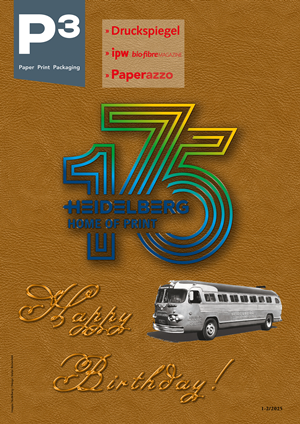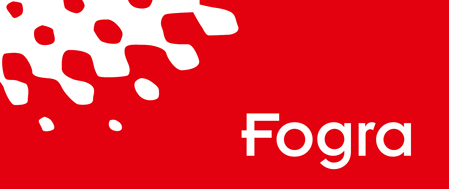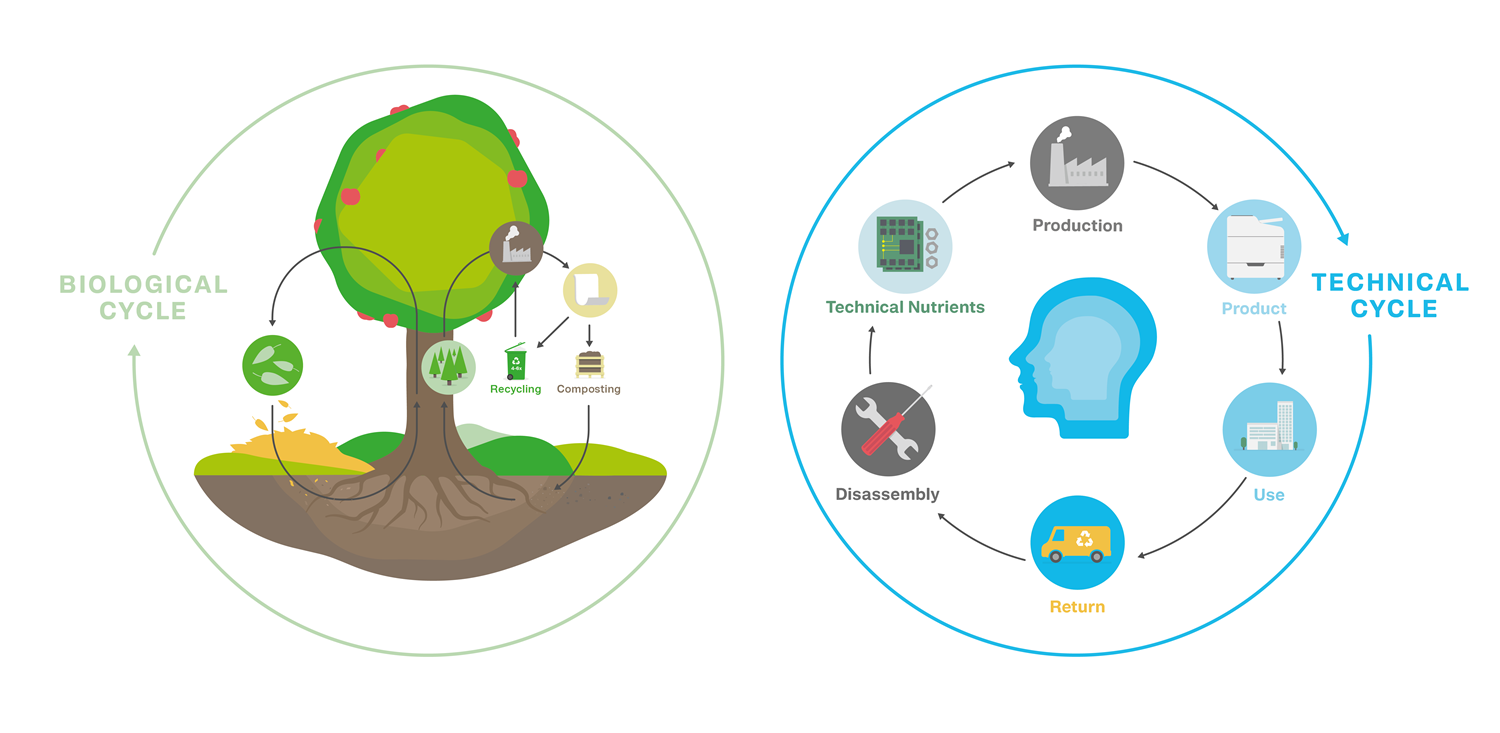P3 3-4/2022 en
Mondi Uncoated Fine Paper
Cradle to Cradle Certified® Bronze is Just the Beginning
Sustainability
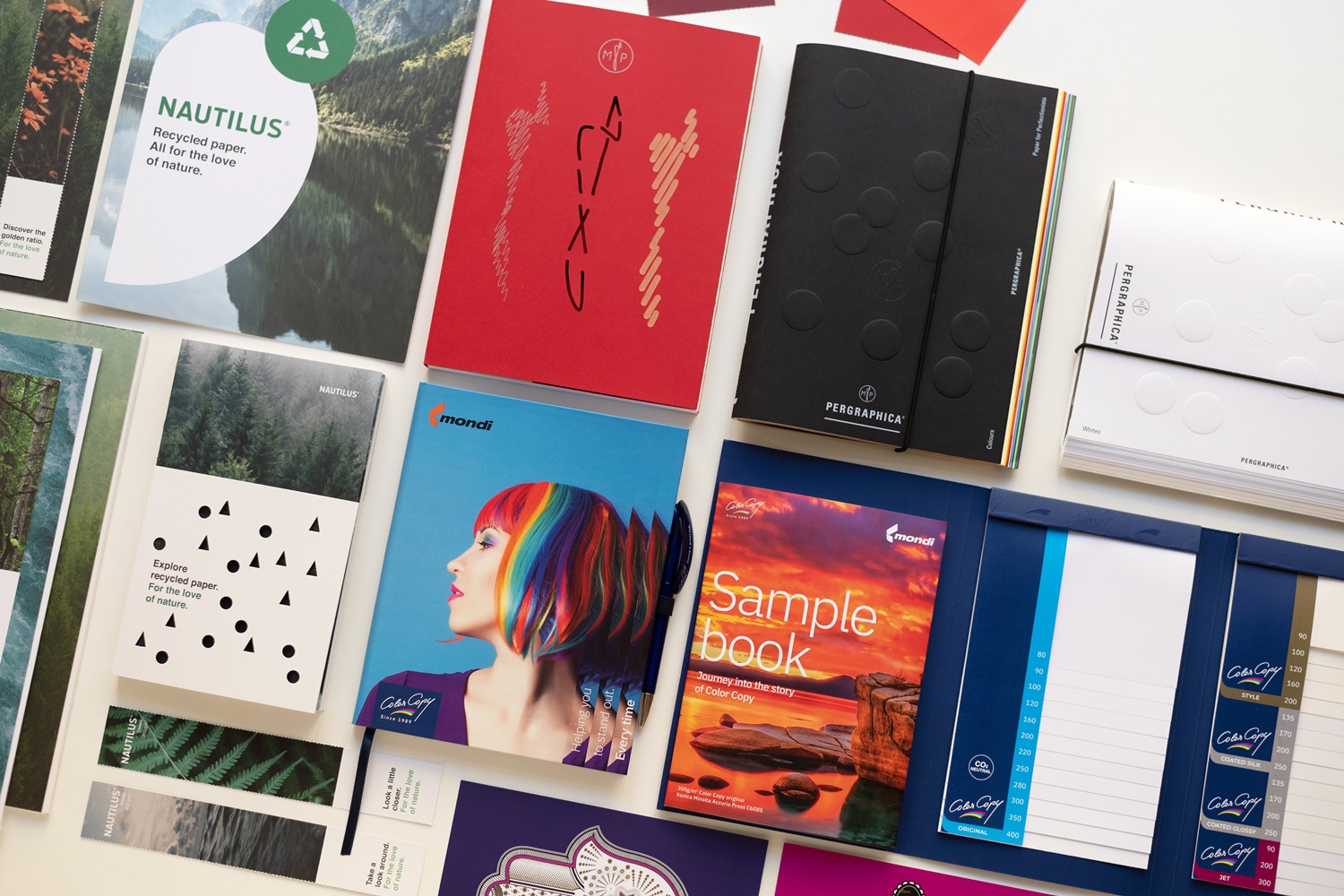
Mondi UFP was the first company to achieve Cradle to Cradle Certified® at the bronze level for the entirety of its own brands.
Continuous and targeted circular economy - that is the basic idea of Cradle to Cradle® (C2C). The concept was developed by Prof. Dr. Michael Braungart and William McDonough at the end of the 1990s. This philosophy of a consistent circular economy shows an alternative path to sustainability. The traditional understanding of sustainability, the so-called eco-efficient approach, follows the principle of damage limitation: Negative effects of production on the environment, for example in the form of waste or CO2 emissions, are to be reduced to a minimum through careful use of resources. But as Prof. Dr. Braungart repeatedly emphasizes in his presentations, “Less bad does not equal good!” Instead, the eco-effective C2C approach pursues the goal of designing products and processes from scratch so that they have a positive effect on both the environment and society. There is ideally no place for waste in this concept - the end of one life cycle is no more than the beginning of a new one.
Mondi UFP was the first company to achieve Cradle to Cradle Certified® at the bronze level for the entirety of its own brands.
The C2C design concept creates the framework to develop products as parts of a closed loop. The C2C approach distinguishes:
- Consumables such as raw materials (biological nutrients such as wood)
- Consumer goods such as machinery (i.e. technical nutrients such as printing machines)
- Goods that can no longer be returned to the cycle in any form, that is, waste products
Strictly speaking, the last category does not have a place in the C2C philosophy and should quickly be replaced by alternatives. In this respect, the C2C design concept classifies materials and products on an ABC-X scale - with “A” for optimally environmentally friendly and “X” for inacceptable, for instance toxic substances.
Transparency of environmental commitment
Whether virgin fiber or waste paper: the best possible use of resources following the principles of the circular economy is common practice at Mondi Uncoated Fine Paper (UFP). The international packaging and paper manufacturer Mondi is pursuing an ambitious sustainability plan, the Mondi Action Plan 2030, in which the company focuses on three core fields of action:
- Innovative packaging and paper solutions that keep materials in circulation and prevent waste
- Empowered and inclusive teams that contribute to a better world
- Climate resilience through forests and operations for the future of the planet
A number of certificates attest Mondi's environmental commitment, such as the EU Ecolabel, the German Ecolabel Blue Angel, or the Austrian Ecolabel. The company emphasizes sourcing wood fibers exclusively from reliable sources with high standards. Nautilus® recycled papers use recycled fibers composed of 100 percent recovered paper. By 2025, 100 percent of all Mondi paper and packaging solutions are to be reusable, recyclable or compostable. Against this background, it was natural for Mondi Uncoated Fine Paper to underline its commitment to the circular economy and quality by participating in the Cradle to Cradle Certified® Products Program. To obtain an assessment which is as realistic as possible, Mondi did not make any changes to its production processes or the product formulation prior to the certification. Mondi was the first company to achieve Cradle to Cradle Certified® at the bronze level for the entirety of its own brands.
The five dimensions of circularity
During the Cradle to Cradle Certified® certification process, accredited assessors examine how a product complies with the principles of the circular economy throughout the various phases of its life cycle. For its own brands, Mondi collaborated with the Cradle to Cradle Products Innovation Institute, which awards the registered label Cradle to Cradle Certified® at various levels for successfully certified products. Here, the organization takes a very precise approach; workplaces and production sites are visited in person or virtually during the certification process. This ensures that the criteria are in fact met. In sum, Cradle to Cradle Certified® certifies, based on clearly defined specifications, that manufacturers use environmentally compatible and recyclable materials as well as regenerative energy sources and take over social responsibility. Customers and consumers benefit from a reliable guidance: The Cradle to Cradle Certified® Products Program and the associated product list show at a glance which suppliers and products meet the strict sustainability standards.
The sustainability of each product is examined in the certification process according to five categories:
- Material health: absence of harmful materials and chemicals
- Product circularity: regenerative products and processes that enable a circular economy
- Clean air and climate protection: avoidance of emissions and use of renewable energies
- Water and soil stewardship: responsible handling of waters and soils
- Social fairness: commitment to human rights and a fair, equitable society
The products are assigned a degree of fulfillment in each of these categories. The principle of the lowest common denominator applies to the overall rating: The lowest rated category determines the overall certification level awarded. To retain the Cradle to Cradle Certified® label, products must be recertified every two years. Thus, the commitment to continuous improvement is an inherent part of the certification.
Material health: formulations under the microscope
Mondi Uncoated Fine Paper produces a wide variety of paper brands in several countries: from office paper brands such as IQ and Maestro® or the Nautilus® recycled papers, to Color Copy, the best-known brand for digital color printing, or Pergraphica® premium design papers for creative projects, publishing and luxury packaging applications. To cohesively set a statement for circularity, the company achieved Cradle to Cradle Certified® at the bronze level for its range of owned brands from the Austrian and Slovakian production sites with a total of more than 100 paper products. “The breadth of our range was the major challenge. We didn't want to single out one particular paper brand. Instead, we wanted to move towards a circular economy as a whole as Mondi Uncoated Fine Paper,” explains Bernhard Cantzler, Head of Marketing & Innovation at Mondi UFP.
The audit of the “material health” category involved immense communication and administrative efforts: The more than 100 Mondi products from factories in several countries contained a total of 250 materials from over 90 suppliers. During the certification process, each supplier had to be contacted individually and instructed on the process itself. To verify the material health, the formulations of the products had to be disclosed to the certification body. For this purpose, Mondi UFP created a main recipe for each individual paper grade with the minimum and maximum quantities of the ingredients used. As part of this process, Mondi UFP has also integrated its food safety laboratory. It is accredited as a testing and analysis laboratory for paper and packaging - particularly for papers and packaging that encounter food and pharmaceuticals.
What about recycling?
C2C experts critically examine classic recycling, as it often turns out to be downcycling: The end result is a less valuable, less “nutritious” product that sooner or later must be disposed as waste. Instead, the C2C design concept aims at upcycling. This avoids the “devaluation” of the material, creating an equally valuable product or a source material for a new cycle. Against this background, conventional recycled paper is problematic from a C2C perspective, in part due to fiber shortening after a certain number of life cycles. However, this has not stopped Mondi UFP from being the first paper manufacturer to submit its recycled paper range for certification – including disclosure of all ingredients. For recycled papers to reach the higher Cradle to Cradle Certified® levels, they must be produced totally chlorine-free (TCF). Mondi does not use chlorine in its recycled papers, but cannot guarantee that the recovered paper used from consumer waste does not contain chlorine. Mondi Uncoated Fine Paper has achieved Cradle to Cradle Certified® Bronze and considers this as an incentive for further improvements along the entire life cycle of the papers. With Color Copy, Mondi offers the first digital color laser paper that meets the specifications of Cradle to Cradle Certified® Bronze. Nautilus® was the first recycled paper to obtain the certification.
Mondi UFP products achieved the bronze level in the Cradle to Cradle Certified® categories of “material health,” “clean air and climate protection,” and “water and soil stewardship”. In terms of product recyclability and social responsibility, the international company's products were even awarded gold. This results in an overall bronze rating. Achieving certification is a snapshot for Mondi UFP - and highlights concrete potential for improvement. “With the certification, we now know where we stand today and where we can do even better,” sums up Bernhard Cantzler.
Additional Sources
http://braungart.epea-hamburg.org/de/content/c2c-design-konzept
https://printelligent.de/cradle-to-cradle-druckerei-lokay/
https://epea.com/index.php?id=165
Cradle to Cradle Certified® is a registered trademark of the Cradle to Cradle Products Innovation Institute.
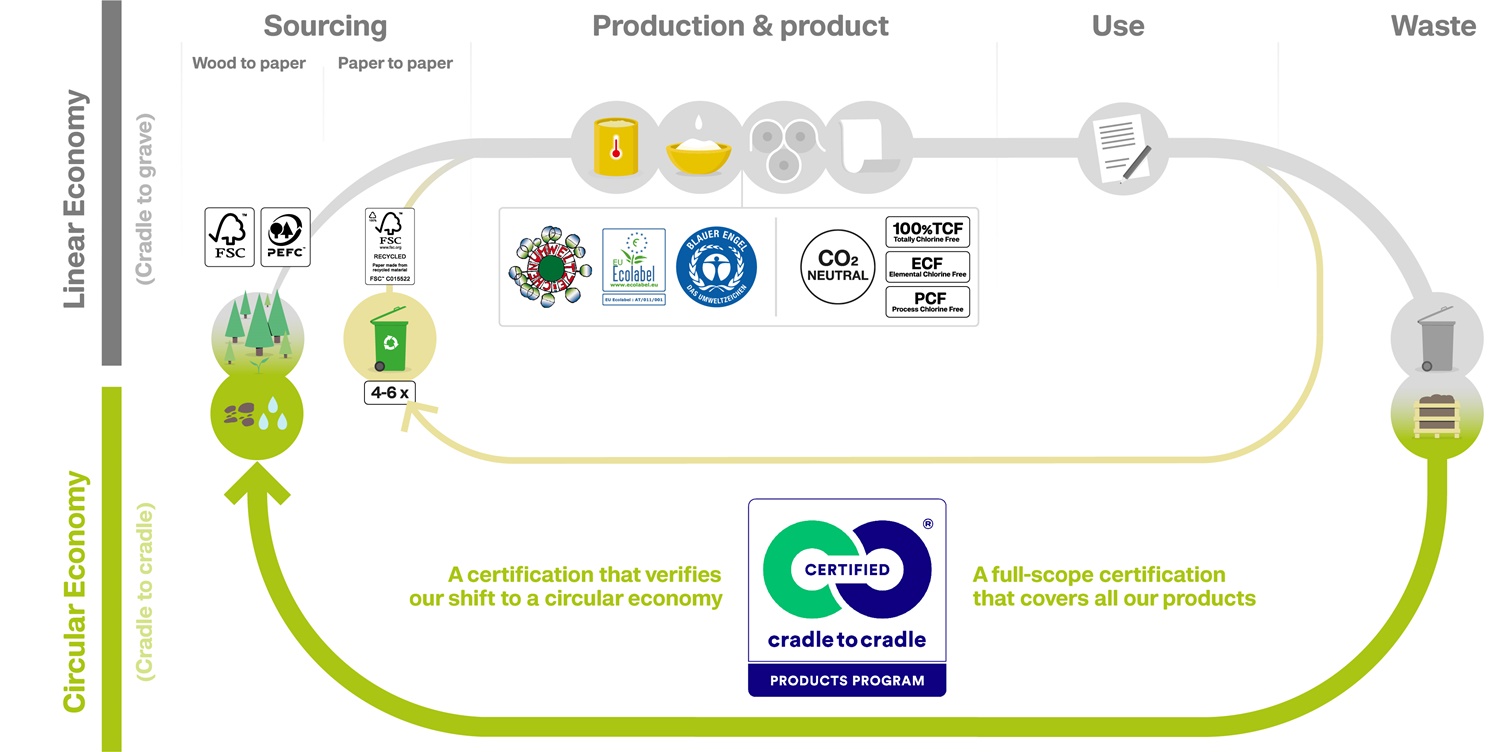
The C2C design concept creates the framework to develop products as parts of a closed loop. The C2C approach distinguishes consumables such as raw materials, consumer goods such as machinery, and waste products.

